Tim Cullinan assumed the IFA presidency with high expectations resting on his shoulders.
In his inaugural speech, he demanded our politicians, then contesting a general election, step up for farmers. “We have heard enough waffle. We need action,” he said.
It’s difficult to compare the IFA’s activity in 2020 to previous years under previous presidents. COVID-19 has taken away its normal rounds of meetings with farmers and face-to-face representations for farmers.
CAP
The IFA maintained a constant “secure the budget/upward only convergence” stance through 2020.
It has now embarked on a series of regional meetings to debate the issues.
The clock is ticking for the association to develop a coherent policy platform, with Ireland due to submit its strategic plan by year end.
While the regional fault lines that emerged in 2013 during the debate around the Ciolos reforms was not much in evidence during the round of regional meetings just completed, the wishlist expressed by farmers from different sectors won’t be accommodated within the budget, which is similar to last time.

Changing of the guard: Tim Cullinan and Joe Healy in January 2020. / Philip Doyle
The IFA, as a catch-all multi-sector organisation, faces the problem that almost any initiative will annoy someone.
Take the straw incorporation proposal, on the face of it a straightforward ‘cash for chopping at harvest’ measure.
While tillage farmers seem delighted, livestock farmers have concerns, and mushroom growers are certain it will damage them.
All are part of the IFA family.
Marrying the need to bring farmers together while advocating a genuinely transformative and balanced payment system for the next CAP is an almost impossible task.
Beef, BEAM, BEEP and TB
A lot of the IFA’s energy was expended on issues centred around cattle.
The BEAM scheme row over the 5% reduction has rumbled through the year, with Cullinan calling on Minister for Agriculture Charlie McConalogue to bring a solution to this Thursday’s IFA agm.
The €50m in COVID-19 support for cattle farmers seemed to surprise the IFA, which had called for €20m days before.
Cullinan was fiercely critical of the PGI proposals brought forward by Bord Bia, asking this paper back in June “are we going to put the PGI badge on the back of a Friesian-cross calf? What is that saying to our suckler farmers?”
It was little surprise that this became an early battleground, for he was very critical of Bord Bia throughout his election campaign.
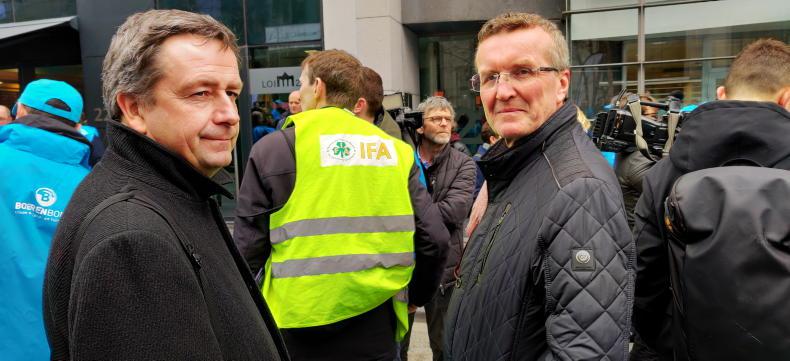
Tim Cullinan with IFA executive director Damian McDonald (left) taking part in a protest against CAP budget cuts in Brussels in February 2020
The final outcome sees those Friesian calves indeed part of the PGI, but bull beef is at least not ruled out.
The commitment to develop a parallel grass-fed beef brand has been claimed by the IFA as the fix to the problems it identified, with farmer oversight on the €6m brand development programme, again within Bord Bia, one tangible gain.
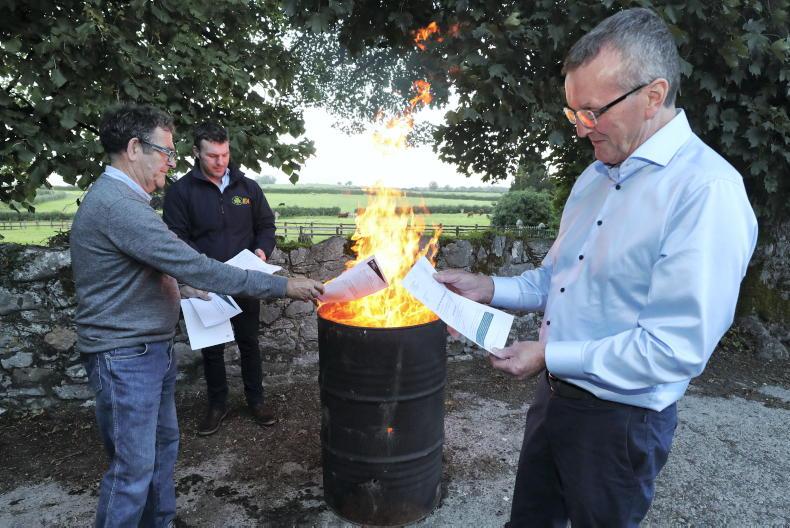
Pat Farrell, Brian Rushe and Tim Cullinan burning the TB herd risk letters in Athy. \ Finbarr O'Rourke
TB was also contentious, with Cullinan leading the burning of the Department’s letters to farmers.
He defended that action as a reflection of the depth of the anger of farmers who could not assemble to express their opinion.
Did it work? The TB strategy has now been agreed with the IFA on board again, saying the concessions they have negotiated makes it a supportable plan. Time will tell.
The court of public opinion
One of the fundamental roles of the IFA president is as the public face and voice of Irish farmers.
Never the smoothest of public speakers, Tim has performed adequately most of the time.
However, there was one very poor interview on RTÉ’s flagship Six One News late in the year.
Anyone can have a bad day but a repeat of that needs to be avoided.
Farmers, and the IFA particularly, need someone who can simultaneously discuss complex issues and win the support - or at the very least the understanding - of the general public.
This is particularly true when debating issues around farming’s relationship with the environment against advocates like Saoirse McHugh or John Gibbons.
External upheaval
As if the pandemic weren’t enough, Cullinan also had to deal with two Taoisigh and four ministers in his first year.
The IFA stayed calm through the chaos of the appointments and rapid departures of Barry Cowen and Dara Calleary, and has quickly established a decent working relationship with eventual minister Charlie McConalogue.

Tim Cullinan and Damien McDonald discuss the importance of appointing a Minister for Agriculture with Taoiseach Micheál Martin last summer.
While he at times sounded sceptical about some environmental issues during the IFA election campaign, there have as yet been no blow-ups with either Minister for the Environment Eamon Ryan or Minister of State in the Department of AgriculturePippa Hackett.
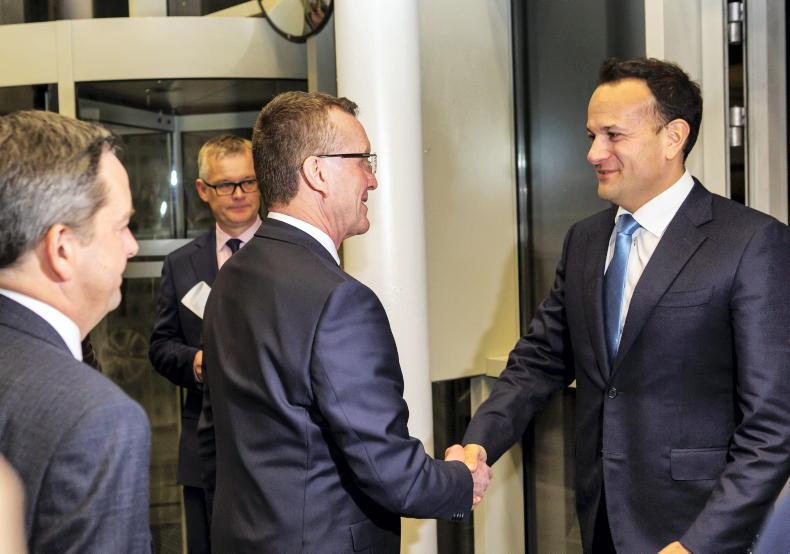
Tim Cullinan welcomes then Taoiseach Leo Varadkar to the 2020 IFA AGM. \ Philip Doyle
The IFA also kept its counsel while Phil Hogan was battling to save his job as European Commissioner for Trade. How history judges that remains to be seen.
Internal IFA
Tim Cullinan had been very critical of the IFA itself on his own campaign trail through 2019, promising change if he were elected. “I intend to move quickly and decisively,” he told the 2020 AGM.
There certainly has been quick and decisive personnel change within the organisation, some of which was put in train before Cullinan’s election.
Senior executives Bryan Barry, Kevin Kinsella, Catherine Lascurettes and Gerry Gunning have all departed, part of a dozen departures.
Currently emerging in public, there is a freshness to a talented new team, but only time will tell if the loss of knowledge will prove damaging.

Tim Cullinan welcomes Micheál Martin to the 2020 IFA AGM. \ Jerome Dunne
It’s fair to say that most newly elected IFA presidents feel resistance from some quarter within the farmer committees in their first year in office. In Cullinan’s case, the relationship with the livestock committee has been tense.
The election debate between Cullinan and Angus Woods got fairly personal, and Woods was the outgoing chair of the livestock committee.
An early suggestion by the president to co-opt unelected nominees to the livestock committee went down like a lead balloon.
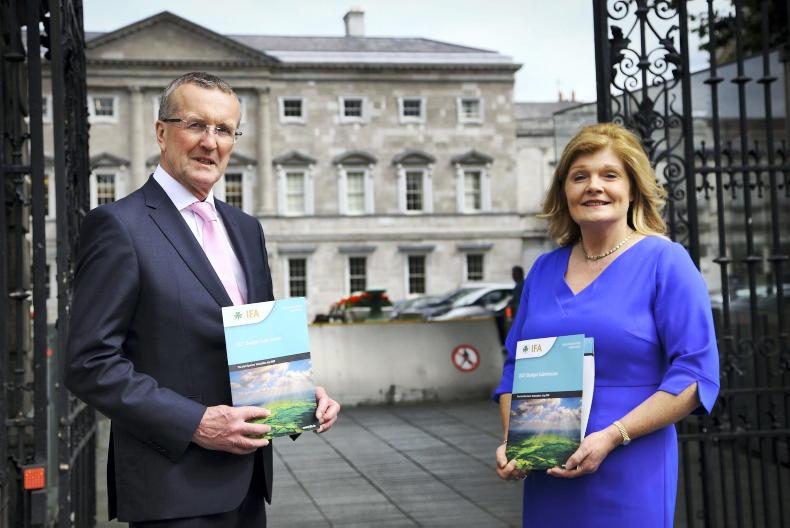
Tim Cullinan with IFA farm business chair Rose Mary McDonagh outside government buildings with the 2021 pre-budget psubmission.
Woods’ successor, Mayo’s Brendan Golden, is an affable and steady character, and the rumblings have never become more than that.
The way the IFA does its business has evolved rapidly to adjust to the restrictions the pandemic has imposed.
Almost a thousand people Zoomed into the online regional meetings over the last week, with healthy engagement.
The IFA’s website and social media presence is constantly improving.
It may be that people who were turned off becoming involved in the association because of the time and travel demands will be more open to taking on a role in a future hybrid model. The lack of travel to meetings has also reduced the IFA’s overheads.
Finances
The association’s finances will be improved by the personnel changes, with the bulk of the cost of the early retirements costed back to the 2019-20 accounting year.
Ultimately, over the course of Cullinan’s four years, it will be the income from members that will determine the IFA’s financial sustainability.
Members must be at least retained, with numbers paying levies increasing towards previous levels.
For that to happen, farmers will want success across the policy platforms.
It’s a tough ask, but Cullinan wanted the job, and it falls to him to lead farmers through a period of significant change.
Tim Cullinan assumed the IFA presidency with high expectations resting on his shoulders.
In his inaugural speech, he demanded our politicians, then contesting a general election, step up for farmers. “We have heard enough waffle. We need action,” he said.
It’s difficult to compare the IFA’s activity in 2020 to previous years under previous presidents. COVID-19 has taken away its normal rounds of meetings with farmers and face-to-face representations for farmers.
CAP
The IFA maintained a constant “secure the budget/upward only convergence” stance through 2020.
It has now embarked on a series of regional meetings to debate the issues.
The clock is ticking for the association to develop a coherent policy platform, with Ireland due to submit its strategic plan by year end.
While the regional fault lines that emerged in 2013 during the debate around the Ciolos reforms was not much in evidence during the round of regional meetings just completed, the wishlist expressed by farmers from different sectors won’t be accommodated within the budget, which is similar to last time.

Changing of the guard: Tim Cullinan and Joe Healy in January 2020. / Philip Doyle
The IFA, as a catch-all multi-sector organisation, faces the problem that almost any initiative will annoy someone.
Take the straw incorporation proposal, on the face of it a straightforward ‘cash for chopping at harvest’ measure.
While tillage farmers seem delighted, livestock farmers have concerns, and mushroom growers are certain it will damage them.
All are part of the IFA family.
Marrying the need to bring farmers together while advocating a genuinely transformative and balanced payment system for the next CAP is an almost impossible task.
Beef, BEAM, BEEP and TB
A lot of the IFA’s energy was expended on issues centred around cattle.
The BEAM scheme row over the 5% reduction has rumbled through the year, with Cullinan calling on Minister for Agriculture Charlie McConalogue to bring a solution to this Thursday’s IFA agm.
The €50m in COVID-19 support for cattle farmers seemed to surprise the IFA, which had called for €20m days before.
Cullinan was fiercely critical of the PGI proposals brought forward by Bord Bia, asking this paper back in June “are we going to put the PGI badge on the back of a Friesian-cross calf? What is that saying to our suckler farmers?”
It was little surprise that this became an early battleground, for he was very critical of Bord Bia throughout his election campaign.

Tim Cullinan with IFA executive director Damian McDonald (left) taking part in a protest against CAP budget cuts in Brussels in February 2020
The final outcome sees those Friesian calves indeed part of the PGI, but bull beef is at least not ruled out.
The commitment to develop a parallel grass-fed beef brand has been claimed by the IFA as the fix to the problems it identified, with farmer oversight on the €6m brand development programme, again within Bord Bia, one tangible gain.

Pat Farrell, Brian Rushe and Tim Cullinan burning the TB herd risk letters in Athy. \ Finbarr O'Rourke
TB was also contentious, with Cullinan leading the burning of the Department’s letters to farmers.
He defended that action as a reflection of the depth of the anger of farmers who could not assemble to express their opinion.
Did it work? The TB strategy has now been agreed with the IFA on board again, saying the concessions they have negotiated makes it a supportable plan. Time will tell.
The court of public opinion
One of the fundamental roles of the IFA president is as the public face and voice of Irish farmers.
Never the smoothest of public speakers, Tim has performed adequately most of the time.
However, there was one very poor interview on RTÉ’s flagship Six One News late in the year.
Anyone can have a bad day but a repeat of that needs to be avoided.
Farmers, and the IFA particularly, need someone who can simultaneously discuss complex issues and win the support - or at the very least the understanding - of the general public.
This is particularly true when debating issues around farming’s relationship with the environment against advocates like Saoirse McHugh or John Gibbons.
External upheaval
As if the pandemic weren’t enough, Cullinan also had to deal with two Taoisigh and four ministers in his first year.
The IFA stayed calm through the chaos of the appointments and rapid departures of Barry Cowen and Dara Calleary, and has quickly established a decent working relationship with eventual minister Charlie McConalogue.

Tim Cullinan and Damien McDonald discuss the importance of appointing a Minister for Agriculture with Taoiseach Micheál Martin last summer.
While he at times sounded sceptical about some environmental issues during the IFA election campaign, there have as yet been no blow-ups with either Minister for the Environment Eamon Ryan or Minister of State in the Department of AgriculturePippa Hackett.

Tim Cullinan welcomes then Taoiseach Leo Varadkar to the 2020 IFA AGM. \ Philip Doyle
The IFA also kept its counsel while Phil Hogan was battling to save his job as European Commissioner for Trade. How history judges that remains to be seen.
Internal IFA
Tim Cullinan had been very critical of the IFA itself on his own campaign trail through 2019, promising change if he were elected. “I intend to move quickly and decisively,” he told the 2020 AGM.
There certainly has been quick and decisive personnel change within the organisation, some of which was put in train before Cullinan’s election.
Senior executives Bryan Barry, Kevin Kinsella, Catherine Lascurettes and Gerry Gunning have all departed, part of a dozen departures.
Currently emerging in public, there is a freshness to a talented new team, but only time will tell if the loss of knowledge will prove damaging.

Tim Cullinan welcomes Micheál Martin to the 2020 IFA AGM. \ Jerome Dunne
It’s fair to say that most newly elected IFA presidents feel resistance from some quarter within the farmer committees in their first year in office. In Cullinan’s case, the relationship with the livestock committee has been tense.
The election debate between Cullinan and Angus Woods got fairly personal, and Woods was the outgoing chair of the livestock committee.
An early suggestion by the president to co-opt unelected nominees to the livestock committee went down like a lead balloon.

Tim Cullinan with IFA farm business chair Rose Mary McDonagh outside government buildings with the 2021 pre-budget psubmission.
Woods’ successor, Mayo’s Brendan Golden, is an affable and steady character, and the rumblings have never become more than that.
The way the IFA does its business has evolved rapidly to adjust to the restrictions the pandemic has imposed.
Almost a thousand people Zoomed into the online regional meetings over the last week, with healthy engagement.
The IFA’s website and social media presence is constantly improving.
It may be that people who were turned off becoming involved in the association because of the time and travel demands will be more open to taking on a role in a future hybrid model. The lack of travel to meetings has also reduced the IFA’s overheads.
Finances
The association’s finances will be improved by the personnel changes, with the bulk of the cost of the early retirements costed back to the 2019-20 accounting year.
Ultimately, over the course of Cullinan’s four years, it will be the income from members that will determine the IFA’s financial sustainability.
Members must be at least retained, with numbers paying levies increasing towards previous levels.
For that to happen, farmers will want success across the policy platforms.
It’s a tough ask, but Cullinan wanted the job, and it falls to him to lead farmers through a period of significant change.








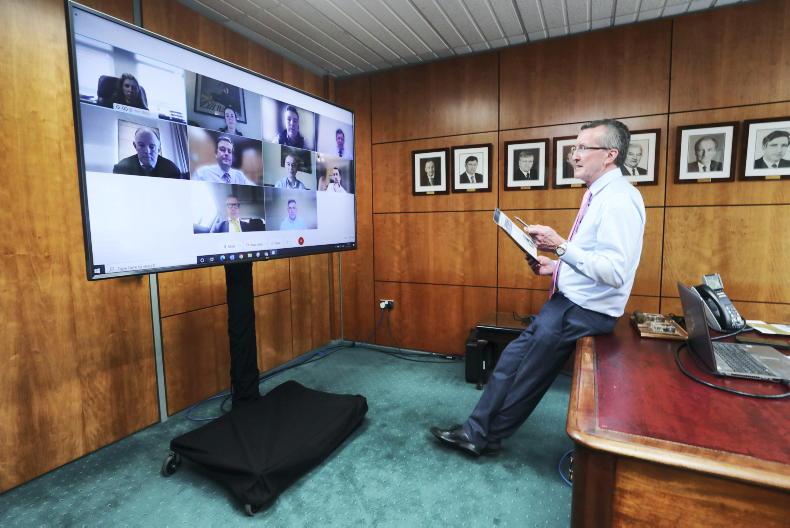





 This is a subscriber-only article
This is a subscriber-only article









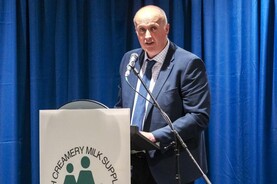
SHARING OPTIONS: